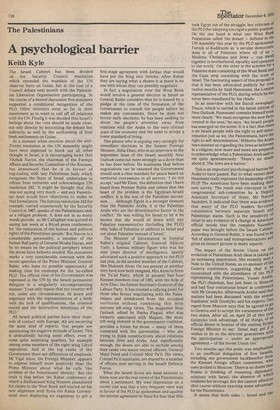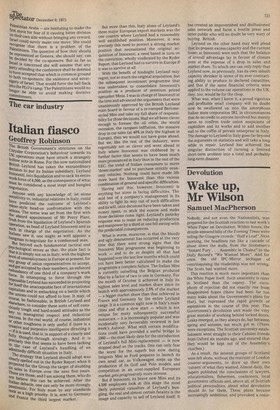The Palestinians
A psychological barrier
Keith Kyle
The Israeli Cabinet has been divided on the Security Council resolution which extended the mandate of the UN observer force on Golan, but at the cost of a Council debate next month with the Palestinian Liberation Organisation participating. In the course of a heated discussion five ministers supported a conditional recognition of the PLO. Other ministers went so far in their resentment as to want to call off all relations with the UN. Finally it was decided that Israel's feelings about the vote should be made clear, not only directly by boycotting the debate but indirectly as well by the authorising of four fresh settlements on Golan.
At a moment when emotion about the antiZionist resolution at the UN Assembly might have been expected to block out all other thought in Israel, it is encouraging news that Yitzhak Navon, the chairman of the Foreign Affairs and Security Committee of the Knesset, has announced that he is in favour of negotiating with 'any Palestinian body which recognises the State of Israel, undertakes to refrain from terrorism and acknowledges UN resolution 242.' It might be thought that this was not saying very much — and any Palestinian Arab would have objections to make to that formulation. The famous resolution 242 for example, carried unanimously by the Security Council in 1967, speaks of the Palestinians only as a refugee problem. It does not in so many words provide, as Mr Callaghan was quoted as saying last week at a Riyad press conference, for 'the restoration of the human and political rights of the Palestinian people.' But Navon is a considerable personality, a member of the former Rafi party of General Moshe Dayan, and by no means on the political periphery where the doves have hitherto resided. His statement marks a very considerable contrast with the recent speeches of the Prime Minister, General Rabin, who loses no possible opportunity of making clear his contempt for the 'so-called PLO'. The official view of his Government was expressed at the UN by the Israeli permanent delegate in a singularly uncompromising manner: 'I can only repeat that my country will not, under any circumstances, sit down and negotiate with the representatives of a body with the lack of qualifications, the criminal record and the destructive intentions of the PLO.'
All Israeli political parties have their channels of contact with Europe. All are receiving the same kind of reports: that people are questioning the negative attitude of Israel. This is undoubtedly having some effect, even in some quite surprising quarters, for example among some members of the right-wing Likud opposition. And in the top ranks of the Government there are differences of emphasis. Mr Yigal Allon, the Foreign Minister, appears to express himself more positively than the Prime Minister about what he calls 'the problem of the Palestinians' identity.' But the truth is that before the Rabat conference :at which a disillusioned King Hussein abandoned his claims to the West Bank and started on his new alignment with Syria the Rabin Government were displaying no eagerness to get a first-stage agreement with Jordan that would have put the King into Jericho. After Rabat they are saying what a shame it is there is no one with whom they can possibly negotiate.
In fact a negotiation over the West Bank would involve a general election in Israel as General Rabin considers that he is bound by a pledge at the time of the formation of the Government to consult the people before he makes any concessions. Since he does not favour early elections, he has been seeking to divert the people's attention away from relations with the Arabs to the very critical state of the economy and the need to accept a lower standard of living.
One person who is arguing very strongly for immediate elections is the former Foreign Minister, Abba Eban, who in an interview in the September issue of the Israeli monthly New Outlook came out more strongly as a dove than he has done before. He maintains that before negotiations can be resumed the Government should seek a clear mandate for peace based on territorial concessions in all sectors. 'I do not accept,' said Mr Eban, the definition that! have heard from Premier Rabin and others that the heart of the problem is the Egyptian-Israeli conflict. It is the war of the Palestine succession. . Although Egypt is a stronger element than the Palestine Arabs, it is 'the Palestine Arabs who are the determinative factor in the conflict.' He was willing for Israel to let it be known that she would sit down with any Palestine representative (including the PLO) who 'talks of Palestine in addition to Israel and not about Palestine instead of Israel.'
The Minister of Information in General Rabin's original Cabinet, General Aharon Yariv, a famous military figure who was for nine years director of intelligence, openly advocated such a positive approach to the PLO last year, as did another member of the Cabinet, Mrs Shalumit Aloni. On one pretext or another they have now both resigned, Mrs Aloni to form the Ya'ad Party, which at present has four Knesset members (out of 120), with the help of Arye Eliav, the former Secretary-General of the Labour Party. It has created a rallying point for those who favour negotiating with the Palestinians and withdrawal from the occupied territories without combining this with extreme left-wing views. The magazine New Outlook, edited by Simha Flapan, who was formerly associated with Mapam, the most left-wing element in the government coalition, provides a forum for those — many of them connected with the universities — who are trying to think constructively about relations between Jews and Arabs. And, significantly enough, the doves are able to include among their ranks two senior retired officers, General Matti Feled and Colonel Meir Pall. His views, Colonel Pail maintains, are shared by a number of officers now serving in the Israeli Defence Forces.
What the Israeli doves are most anxious to know now are the real views of the Palestinians about a settlement. My own impression on a recent visit was that a very frequent view was in favour of the PLO as spokesman and against the interim agreement in Sinai for fear that this
took Egypt out of the struggle, but criticism of the PLO for adopting too rigid a public position. On the one hand is what one West Baltic Palestinian called 'the dream' — defined in the UN Assembly this year by the PLO spokesman Farouk al-Kaddoumi as 'a secular democratic state in all of Palestine where all of us — Muslims, Christians and Jews — can dwell together in brotherhood, equality and openness to the world.' On the other is the scheme tor a Palestine state consisting of the West Bank and the Gaza strip coexisting with the state of Israel. The fascinating aspect of this propoal is that it has been advocated publicly for over twelve months by Said Hammami, the London representative of the PLO, during which he has never been repudiated by his chiefs. In an interview with the Dutch newspaper Trouw, which is carried in the latest edition of New Outlook, Hammami commits himself even more clearly. 'We must recognise the new facts created in the area,' he says. 'An Israeli people has emerged on the scene. It is a fact that there is an Israeli people with the right to self-determination just as we, the Palestinians, have the right to self-determination,' Hitherto the Arabs have insisted on regarding the Jews as believers in a religion; now more and more are prepared to acknowledge what a Palestinian Arab said to me quite spontaneously: 'There's no doubt about it. The Jews are a nation.'
This is an important psychological barrier for Arabs to have passed. But to what extent does Hammami really represent the leadership of the PLO? The Americans have been making their own survey. The result was conveyed to the congressional sub-committee by a Dentlt3r Assistant Secretary of State, Mr Harold Saunders. It indicated that there was evidence that many of the PLO leaders favoured coexistence between separate Israeli and Palestinian states. Such is the sensitivity of Israel to any evidence of a change in American official moods that the complete Saunders paper was brought before the Israeli Cabinet' According to General Rabin, it was found to be 'full of distortions and misrepresentations and gives an inexact picture in many aspects.'
The impact of the Soviet Union on the evolution of Palestinian Arab ideas is taking oh an increasing importance. She recently sent Note to the United States, as co-sponsor of the Geneva conference, suggesting that it he reconvened with the attendance of the PO representing the Palestinians. Yasser Arafat' the PLO chairman, has just been to Moscow and had 'four continuous hours' in conference with Mr Gromyko. Afterwards Arafat said that matters had been discussed 'with the utmost frankness' with Gromyko and his experts. One report from Moscow says that he agreed to ge to Geneva and to accept the coexistence nf the two states. After all, on April 23 of this Year Gromyko took advantage, of all things, of .° official dinner in honour of the visiting SYrlar Foreign Minister to say: 'Israel may get if it wishes to do so the strictest guarantees with the participation — under an approprlate agreement — of the Soviet Union too.' Two months ago this point was emphasised to an unofficial delegation of five Israelis, including one government backbencher troll') the Knesset foreign affairs committee, Whe. ' were invited to Moscow. There is no doubt t1T. Russia is thinking of resuming diplorriaPeti relations with Israel, the absence of WhIc weakens her leverage, but she cannot afford to alter course without exacting some advantage for the Palestinians.
It seems that both sides — Israel and the
Palestinian Arabs — are hesitating to make the first move for fear of it causing bitter division on their own side without bringing any reward. Israel could surely make one move. She could recognise that there is a problem of the Palestinians. The question of how they should be represented at Geneva, she should say, can he decided by the co-sponsors. But as far as Israel is concerned she will assume that any Party attending the conference shall be deemed to have accepted that which is common ground to both co-sponsors: the existence and sovereignty of Israel. That would force the ball back into the PLO's camp. The Palestinians would no longer be able to avoid making decisive coMMitments.


































 Previous page
Previous page